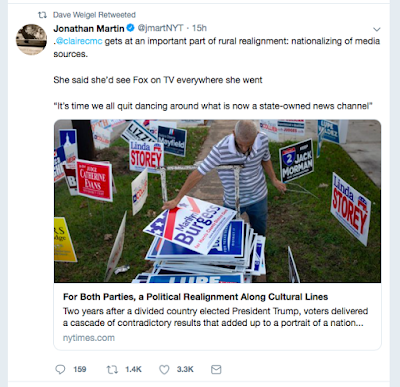Here is a quote from the New York Times story this morning, "For Both Parties, a Political Realignment Along Cultural Lines,"
The midterm elections on Tuesday laid bare the growing chasm between urban and rural America, leaving Republicans deeply concerned about their declining fortunes in the metropolitan areas that extinguished their House majority and Democrats just as alarmed about their own struggles to win over voters in states that strengthened the G.O.P.’s grip on the Senate.I think the focus on "cultural" issues rather than on race (which may effectively mean the same thing) is interesting. That NYT story by Jonathan Martin and Alexander Burns then turns to Eric Cantor, former majority leader of the House who was ousted from his district by the more conservative newcomer Dave Brat in the 2014 midterms. Cantor lamented the apparent "collapse of the longstanding political alliance between culturally conservative rural voters and high-income suburbanites who are focused on the economy and issues like education and child care."
This is interesting because I never perceived any real allegiance or meaningful coalition between suburbanites and rural folks regarding any issues, least of all those like child care. That's mostly, I guess, because rural folks have little hope of ever having child care--or for better education funding for rural schools, which are costly because of inabilities to achieve economies of scale. When it comes to education, I would assume that rural and suburban schools actually compete with each other for funds.
Here's another quote with rural overtones:
Democrats further retrenched from the agricultural and industrial communities where they once dominated.Which leads me to this from Tom Vilsack, former governor of Iowa who was also agriculture secretary in the Obama administration, who "complained bitterly about his party's worsening struggles with rural voters."
“It’s so frustrating,” said Mr. Vilsack, who has been pleading with Democrats to aggressively court the Farm Belt. “You pick out the interest group that’s part of our base and we always have a message for all of those folks, but we don’t do the same thing for folks in rural places.”Note Vilsack's implicit rurality as identity point, a staple of this blog and some of my earlier writing.
Here's another story out today's NYT on the mid-terms, this one by Mitch Smith and Monica Davey, focused on the Midwest.
Similarly, I noticed some folks on Twitter lamenting the Democrats' problem with rural voters, the alienation of rural voters rom the Democratic Party. Among these is Alec MacGillis of ProPublica, whose work I have cited extensively here. Here he re-Tweets Matt Stoller, policy director of the Open Markets Institute.
Here's a Tweet from Dave Weigel of the Washington Post, who writes about politics. He comments on Missourian Claire McCaskill 's failed bid to keep her U.S. Senate seat. Note the focus on lack of local news outlets and the nationalizing of media sources--especially the impact of Fox News.
And here is a salient Tweet from Jedediah Purdy of Duke Law School:
Meanwhile, Cheri Bustos, U.S. Congresswoman from rural western Illinois who helped formulate the Democrats' come-back strategy, was upbeat on National Public Radio the morning after. She was focused on the infrastructure Dems could support rather than on the culture wars stuff, which she has previously advised the Democrats to avoid.
Lastly, I'll link to this from 10 days before the election, on how Colorado effectively bridges the rural-urban divide, from Roger Cohen of the New York Times. That, in turn, reminds me of this piece on the rural-urban divide in Colorado, this before the 2016 election.
Post Script: David Leonhardt of the New York Times titles his daily email on Friday, Nov. 9, "America's Small Town Crisis." He cites Stoller and MacGillis--and quotes them, too. He also has this to say:
Post Script: David Leonhardt of the New York Times titles his daily email on Friday, Nov. 9, "America's Small Town Crisis." He cites Stoller and MacGillis--and quotes them, too. He also has this to say:
I understand why talk of rural America often frustrates progressives: Rural America — which is, of course, overwhelmingly white — already has outsize political power in this country, thanks to the Senate, the Electoral College and the privileged role that Iowa and New Hampshire play in presidential elections. But life in rural areas and small cities hasn’t exactly been easy in recent years. In virtually every measurable way — incomes, wealth, education, health, longevity — large metropolitan areas have done better.
Democrats should, by all means, continue fighting for the issues that matter to metropolitan America, like civil rights. But there is a clear moral case for devoting more attention to small-town America at the same time. There is also a self-interested political case for Democrats.In other words, Dems don't have to choose between supporting metro areas and civil rights on the one hand and rural interests on the others. As I have written before, that is a false choice.





No comments:
Post a Comment